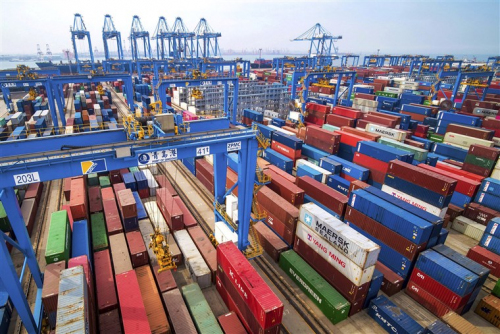
Stakeholders in the maritime industry have raised concerns over the implementation of the International Cargo Tracking Note (ICTN), citing cost implications on shippers and technological limitations as significant threats to its implementation.
Recall that in February 2023, the Federal Executive Council (FEC) approved the introduction of Electronic Cargo Tracking Notes for seaports nationwide. It said the ECTN will tackle several challenges, such as the under-declaration, concealment and wrong classification of important cargo, which are the primary causes of revenue leakages, insecurity and safety issues at the borders.
In September 2023, the Minister of Marine and Blue Economy, Adegboyega Oyetola assured the Nigerian Shippers’ Council (NSC) that his administration is committed to actively working towards the implementation of the Cargo Tracking Note and Single Window Project to enhance the efficiency of business operations at the nation’s ports.
However, speaking during a familiarization visit to Tin Can Island Container Terminal (TICT) and Port and Cargo Terminals in January 2024, the Executive Secretary of the NSC, Mr Pius Akutah noted that the council is actively engaged in collaborative efforts with stakeholders to expedite the process, aiming for the CTN to be fully operational by the second quarter of 2024.
But, addressing the matter last week, the NSC Director of Research and Strategic Planning, Mr. Rotimi Anifowose acknowledged that while plans are progressing, the timeline might stretch beyond initial expectations.
Emphasizing ongoing preparations to address logistical and regulatory requirements crucial for the ICTN’s implementation, Anifowose noted that despite efforts to streamline the processes, achieving implementation by the second quarter of 2024 appears unlikely.
However, the NSC Director stressed that the implementation remains achievable within the year. He expressed confidence in meeting the target before the end of the year.
In his words: “The implementation might take a bit longer than expected. But it is still something that is feasible within the year. Plans are ongoing, moves are being made to make sure that they tidy-up the area that needs to be tidied-up. Then the implementation will start. That’s all I can say.
“I can tell you that we might not be able to make the second quarter. I can’t also be precise before the third quarter. But I can be exact to say that on or before the end of the year, we should have the electronic cargo tracking note implemented” Anifowose assured.
Also speaking, a member of the Importers Association of Nigeria (IMAN), Mr Ayopade Omolale highlighted significant technological obstacles as the country aims to integrate Information Technology advancements, particularly with the implementation of the ICTN.
Acknowledging Nigeria’s gradual adaptation to global Information Technology trends, Omolale pointed out that even the NSC is in the early stages of upgrading to the “Know Your Client” (KYC) system for registering port users, marking a crucial step toward modernization.
While expressing concerns about Nigeria’s technological preparedness, Omolale anticipated potential technical challenges in the implementation. He also highlighted potential efficiency improvements for cargo owners and the Shippers Council through reduced reliance on manual processes.
“I know the obstacle they are going through is the fact that Nigeria is still backwards in the area of IT and tech. There may be a little bit of technical challenges. It is a very good idea. It will really help cargo owners; it will also help the Shippers’ Council itself. We will not need to do most things manually. It’s going to come to us technology-wise” Omolale said.
On his part, the National Secretary of the Association of Registered Freight Forwarders of Nigeria (AREFFN), Mr Frank Obiekezie acknowledged that the ICTN, a long-discussed initiative, is seen as beneficial for enhancing economic security and bolstering maritime safety.
However, Obiekezie raised concerns about the financial implications of the ICTN, questioning who will bear the costs associated with its implementation, which could potentially burden cargo owners. He noted that while the Nigerian government shows strong interest in the ICTN, there remains a critical need for clear and transparent cost allocation policies to prevent undue financial strain on stakeholders.
“The Electronic Cargo Tracking Note has been in the news for a long time, It will be good for the economy, it will be good for our own security as well, but one would ask who bears the cost. I think that was where we had the issue some time ago, because everything, at the end of the day, will come to the cargo owner. But I think the Nigerian government is very much interested in that”, he noted.















